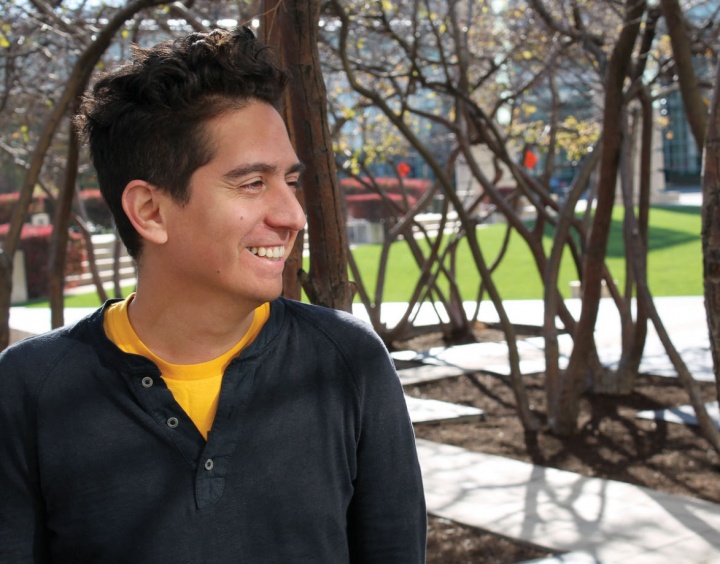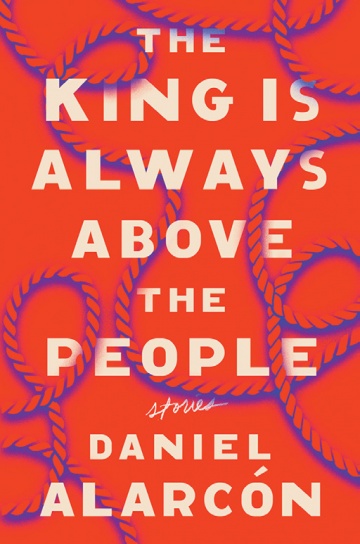Columbia College | Columbia University in the City of New York
Intensity in 10 Stories
Daniel Alarcón ’99’s latest work explores gritty themes
When CCT last featured Daniel Alarcón ’99 in “Columbia Forum,” in 2010, he was a first-time novelist. Though still in the early stages of his literary career, the Peruvian-born Alarcón had nonetheless achieved an unusual degree of success. His first short story collection, War by Candlelight (2005), was a finalist for the PEN/Hemingway Award; his novel, Lost City Radio (2007), had been named a Best Novel of the Year by the San Francisco Chronicle and The Washington Post. In 2010, The New Yorker named him to its list of the young fiction writers who were “key to their generation.”

Hugo Rojo
Alarcón’s fictions are always a seductively unusual hybrid: personal stories saturated with the kind of economic and political awareness that is second nature to a journalist. In his story “City of Clowns” — darkly rendered as a graphic novel by Peruvian artist Sheila Alvarado — the hero, a reporter named Chino, roams Lima’s rough alleys and squares as he wrestles with his father’s death and the legacy of growing up poor in a rough, corrupt capital city. Alarcón may acknowledge the power of politics, but his work’s driving force is a journalist’s basic inquisitiveness. “I write what I’m curious about,” he told Kirkus Reviews in 2017.
So it’s not a surprise that — while continuing to write well-received fiction — Alarcón has also become a force in the field of reportage. (He currently is an assistant professor of broadcast journalism at the Journalism School.) While his stories have appeared in prestigious print venues (Granta, Harper’s, The New York Times Magazine), Alarcón’s most important contribution has been made in public radio. In 2012, he co-founded NPR’s “Radio Ambulante,” a Spanish-language podcast devoted to telling Latin American stories. “Latin America is a continent of narrators, and for us it was obvious to put such oral tradition together with radio,” Alarcón told the online publication NiemanLab. Reminiscences about the 1980s’ “friki” Cuban metal music scene mingle with reports from Venezuelan prison life; Mother Jones describes it as “This American Life en Español.”
In his latest book of short stories, The King Is Always Above the People (Riverhead Books, $27), Alarcón continues to cover the themes that weave through today’s grim headlines: migration, poverty, dislocation. The first story, “The Thousands,” set in a nameless city, is a rousing account of a destitute community that builds itself a place to live from society’s refuse. (“In a place like Lima there’s a neighborhood like The Thousands in every direction,” Alarcón told Kirkus.) This opening salvo is what he calls “an invocation,” summoning up both a sense of place and his characters’ disenfranchised yet hopeful state of mind. Excerpted here, the story is brief but intense, like a shot of pisco.
— Rose Kernochan BC’82

The Thousands
There was no moon that first night, and we spent it as we spent our days: your fathers and your mothers have always worked with their hands. We came in trucks, and cleared the land of rock and debris, working in the pale yellow glow of the headlights, deciding by touch and smell and taste that the land was good. We would raise our children here. Make a life here. Understand that not so long ago, this was nowhere. The land had no owner, and it had not yet been named. That first night, the darkness that surrounded us seemed infinite, and it would be false to say we were not afraid. Some had tried this before and failed — in other districts, on other fallow land. Some of us sang to stay awake. Others prayed for strength. It was a race, and we all knew it. The law was very clear: while these sorts of things were not technically legal, the government was not allowed to bulldoze homes.
We had until morning to build them.
The hours passed, and by dawn, the progress was undeniable, and with a little imagination one could see the bare outlines of the place this would become. There were tents made of tarps and sticks. There were mats of woven reeds topped with sewn-together rice sacks, and sheets of pressboard leaning against the scavenged hoods of old cars. Everything the city discarded we’d been saving for months in preparation for this first night. And we worked and we worked, and for good measure spent the last hours of that long night drawing roads on the earth, just lines of chalk then, but think of it, just think . . . We could see them—the avenues they would be — even if no one else could. By morning, it was all there, this ramshackle collection of odds and ends, and we couldn’t help but feel pride. When we finally stopped to rest, we realized we were cold, and on the soft slope of the hill, dozens of small fires were built, and we warmed ourselves, each taking comfort in it, in our numbers, in this land we had chosen. The morning dawned pale, the sky scoured clean and cloudless. “It’s pretty,” we said, and yes, the mountains were beautiful that morning.
They still are. The government arrived before noon and didn’t know what to do. The bulldozers came, and we stood arm in arm, encircling what we had built, and did not move. “These are our homes,” we said, and the government scratched its febrile head. It had never seen houses like ours — our constructions of wire and aluminum, of quilts and driftwood, of plastic tarps and rubber tires. It came down off its machines to inspect these works of art. We showed the government the places we’d made, and eventually it left. “You can have this land,” it said. “We don’t want it anyway.”
The newspapers wondered where the thousands had come from. How we had done it. And the radio asked as well, and the television sent cameras, and little by little we told our story. But not all of it. We saved much for ourselves, like the words of the songs we sang, or the content of our prayers. One day, the government decided to count us, but it didn’t take long before someone decided the task was impossible, and so new maps were drawn, and on the empty space that had existed on the northeastern edge of the city, the cartographers now wrote The Thousands. And we liked the name because numbers are all we ever had.
Of course, we are many more than that now.
From THE KING IS ALWAYS ABOVE THE PEOPLE by Daniel Alarcón, published by Riverhead Books, an imprint of Penguin Publishing Group, a division of Penguin Random House, LLC. Copyright © 2017 by Daniel Alarcón.
Issue Contents
Published three times a year by Columbia College for alumni, students, faculty, parents and friends.
Columbia Alumni Center
622 W. 113th St., MC 4530, 6th Fl.
New York, NY 10025
212-851-7852
cct@columbia.edu
Columbia Alumni Center
622 W. 113th St., MC 4530, 4th Fl.
New York, NY 10025
212-851-7488
ccalumni@columbia.edu

